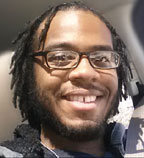
 The continuing education of Marcus McPherson
The continuing education of Marcus McPherson
By April Eugene
Before finding out that he was HIV positive, McPherson had a lackadaisical attitude toward finishing his graduate studies at Jackson State University in Mississippi. All that changed one day when he decided to skip class and take an HIV test, which came back positive. “I was kind of nonchalant about things, questioning whether or not I wanted to finish grad school,” he says. “Ever since I got the diagnosis, it made me focus on my health; it made me become more focused on finishing school, setting goals and accomplishing those goals.”
One of those goals was becoming more informed about HIV. He joined My Brother’s Keeper, a support group hosted by an organization of the same name, designed to enhance the health and well-being of PLWHA. It was there that he met Cedric Sturdevant, a project coordinator who became his role model. “He is my mentor; he is the person that I aspire to be because of just seeing how he was able to openly tell his story to affect different people,” McPherson says. Sturdevant noticed that McPherson was well-spoken and not afraid to tell his story, so he invited McPherson to participate in the Black Treatment Advocates Network (BTAN), which he co-chairs in Jackson.
Although McPherson was already receiving drug assistance through the Ryan White HIV/AIDS Program and the AIDS Drug Assistance Program, or ADAP, it was through BTAN that he learned how the medicine really worked.
“Before I was diagnosed, I just knew you could get HIV from unprotected sex,” he says. “I didn’t know anything about CD4 counts or what the different types of medicines actually do,” he says. “BTAN really helped me to understand HIV from a scientific and medical point of view.”
Indeed, in the year and a half since he was diagnosed, McPherson says, he has never missed a dose.
He shares his story on social media sites in order to reach as many people as possible. He also speaks at testing events and other venues. McPherson credits BTAN with helping him to refine his story to reach different audiences. “I work around a lot of college students and younger individuals, so I encourage them to get tested, first of all, and then I let them know my story,” he says. “They need to know that if you’re HIV positive, it’s not the end of the world. They can still have a life; they can still have goals in life.”
McPherson continues, “I think about so many people that I’ve met in the last two years since I’ve been diagnosed who have passed away in their teens or 20s because they were not taking their medication. I want to live my life sort of like a dedication to them. I want to make sure that their legacy is upheld.
It would be nice to be able to go into high schools and get them when they first start having sex, but [Mississippi] is one of the states where you can’t even discuss condoms or safe sex in sex-education classes. And there’s a lot of misinformation out there in the community, especially the LGBT community in the South.”
Now 29, McPherson recently finished his graduate studies in public-policy administration and this fall will enter New York University’s Ph.D. program in sociology. “Public-policy administration has helped me understand how policies and laws have driven the public perception of certain things such as HIV education and awareness,” he says. McPherson points to HIV-criminalization laws, which can have an adverse effect on health care and exist in Mississippi and other states. “In a lot of instances when a person is diagnosed with HIV, they’re so focused on taking care of their health that they don’t realize there are laws that can affect them,” he adds.
McPherson plans to study social stratification: “Like how we as a society classify people, especially in the LGBT community—people with HIV, AIDS and STDs. Because in a social scene, a lot of people look disparagingly upon HIV-positive individuals. I want to understand where that comes from, why those people have those attitudes. No one has taken the time to do that research.”
He encourages HIV-positive individuals to get as much knowledge as possible. “I’ve had people tell me that they could not imagine that they could go to grad school and deal with HIV and medication and doctor’s appointments, and I’m just that proof that you can do it. You can do whatever you set your mind to.”
April Eugene is a Philadelphia-based writer.


Be the first to comment